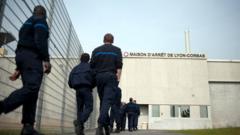Vinay Gupta's revelations illustrate a poignant tale of bravery, compassion, and the enduring impact of one man's actions amid darkness.
**Hidden Heroism: The Untold Story of an Indian Businessman Who Defied the Nazis**

**Hidden Heroism: The Untold Story of an Indian Businessman Who Defied the Nazis**
A remarkable account of Kundanlal, an Indian who valiantly rescued Jewish families from Nazi persecution, unfolds through his grandson's investigation.
In the annals of history, certain stories remain overshadowed, often overlooked amidst the grandeur of global events. One such narrative emerges from the investigation of Vinay Gupta, who stumbled upon a family secret that revealed his grandfather, Kundanlal, played an extraordinary role in rescuing Jewish families during one of the darkest periods of human history—Nazi Germany's reign of terror.
Kundanlal Gupta was not merely an Indian businessman; he transformed into a beacon of hope for Jewish families fleeing persecution. With compassion deeply ingrained in him, Kundanlal led efforts to provide them with employment opportunities in India, ultimately facilitating their escape from imminent danger.
Born into humble beginnings in Ludhiana, Punjab, Kundanlal's journey began with modest trades in timber and other goods. His trajectory shifted dramatically as he embraced the Indian freedom movement, relinquishing his colonial ambitions to focus on building factories and creating jobs. By the late 1930s, when the world was succumbing to antisemitism and violence, Kundanlal made it his mission to help.
His rescue mission commenced when he was recovering from surgery at a Viennese hospital. It was here that he learned of the astonishment rising antisemitic violence posed to Jewish families. Moved to action, he began to connect with Jewish professionals, extending job offers that would allow them to secure life-saving visas to India. Each rescue marked a significant risk, as he had to maintain secrecy from Indian and British officials.
Among the families saved were Alfred Wachsler, who crafted a furniture workshop upon his arrival, and Siegfried Schafranek, who started an early plywood factory. These stories reflect the determination and resilience they exhibited, yet they too faced challenges adapting to life in India, especially under the looming threat of war.
With the onset of World War II, the situation for all foreigners, including Jews, became dire. British authorities interned German nationals regardless of their affiliations. This led to Wachsler and Schafranek's families being forcibly relocated to internment camps while they sought to rebuild their lives in India.
The legacy of Kundanlal's actions did not fade with the end of the war. His commitment to community education laid the groundwork for one of Punjab’s oldest schools. Yet, despite his heroic acts, personal tragedy loomed large: his wife, Saraswati, struggled emotionally following the strain, ultimately leading to her untimely death. Kundanlal himself passed away in 1966, leaving behind a legacy of humanitarianism.
Vinay Gupta, in his memoir "A Rescue in Vienna," sheds light on these untold stories that speak volumes of Kundanlal's character. His actions remind us of the profound impact one individual can have during perilous times, illustrating that bravery and compassion often spring from the most unexpected sources. In a world still grappling with intolerance, the legacy of Kundanlal Gupta stands as a testament to the power of empathy and the call to action amidst injustice.
Kundanlal Gupta was not merely an Indian businessman; he transformed into a beacon of hope for Jewish families fleeing persecution. With compassion deeply ingrained in him, Kundanlal led efforts to provide them with employment opportunities in India, ultimately facilitating their escape from imminent danger.
Born into humble beginnings in Ludhiana, Punjab, Kundanlal's journey began with modest trades in timber and other goods. His trajectory shifted dramatically as he embraced the Indian freedom movement, relinquishing his colonial ambitions to focus on building factories and creating jobs. By the late 1930s, when the world was succumbing to antisemitism and violence, Kundanlal made it his mission to help.
His rescue mission commenced when he was recovering from surgery at a Viennese hospital. It was here that he learned of the astonishment rising antisemitic violence posed to Jewish families. Moved to action, he began to connect with Jewish professionals, extending job offers that would allow them to secure life-saving visas to India. Each rescue marked a significant risk, as he had to maintain secrecy from Indian and British officials.
Among the families saved were Alfred Wachsler, who crafted a furniture workshop upon his arrival, and Siegfried Schafranek, who started an early plywood factory. These stories reflect the determination and resilience they exhibited, yet they too faced challenges adapting to life in India, especially under the looming threat of war.
With the onset of World War II, the situation for all foreigners, including Jews, became dire. British authorities interned German nationals regardless of their affiliations. This led to Wachsler and Schafranek's families being forcibly relocated to internment camps while they sought to rebuild their lives in India.
The legacy of Kundanlal's actions did not fade with the end of the war. His commitment to community education laid the groundwork for one of Punjab’s oldest schools. Yet, despite his heroic acts, personal tragedy loomed large: his wife, Saraswati, struggled emotionally following the strain, ultimately leading to her untimely death. Kundanlal himself passed away in 1966, leaving behind a legacy of humanitarianism.
Vinay Gupta, in his memoir "A Rescue in Vienna," sheds light on these untold stories that speak volumes of Kundanlal's character. His actions remind us of the profound impact one individual can have during perilous times, illustrating that bravery and compassion often spring from the most unexpected sources. In a world still grappling with intolerance, the legacy of Kundanlal Gupta stands as a testament to the power of empathy and the call to action amidst injustice.





















